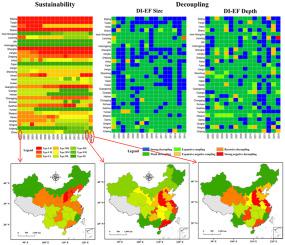Journal of Cleaner Production ( IF 9.7 ) Pub Date : 2021-02-23 , DOI: 10.1016/j.jclepro.2021.126486 Feifei Wu , Xiaohua Yang , Zhenyao Shen , Dehui Bian , Pius Babuna

|
The sustainable utilization of natural capital and its decoupling from economic growth are of vital importance to sustainable development. To measure the pressure on local natural capital, we proposed local ecological footprint (EF) accounts, including production-based biological accounts and consumption-based energy and build-up land accounts. We also modified the yield factor to facilitate temporal and regional comparisons for footprint indicators, based on the inter-temporal yield factor (IYF) and net primary production. The sustainability and decoupling effects of natural capital utilization were evaluated in 30 provinces of China during 2000-2016 using a modified three-dimensional EF model, sustainability reclassification method and decoupling index. The results indicated that a growing footprint became more dependent on local natural capital than on embodied net imports. From 2000 to 2016, local EF and biocapacity in terms of per capita in China increased by 1.16 times and 10.4%, respectively. The ecological deficit reached its peak in 2015 (1.85 global hectares/capita). The ecological surplus occurred in 10 provinces in 2000, while all provinces were in a state of ecological deficit in 2016. Per capita EF size increased in 25 provinces, due to the increase in IYF of cropland and build-up land area. EF depth in all provinces exceeded the original value of 1 and increased with values ranging from 0.10 to 5.81. The dominant sustainability types changed from low size-low depth in 2000 to low size-high depth and high size-low depth in 2016. Sustainability in China decreased overall despite increasing in 6 provinces. The decoupling of gross domestic product from EF size and depth was dominated by weak decoupling, followed by strong decoupling. Strong decoupling in EF size and weak decoupling in EF depth during 2014-2015 resulted in a severe deficit in 2015. These findings can provide insights for improving resource use efficiency and pursuing sustainable development.











































 京公网安备 11010802027423号
京公网安备 11010802027423号